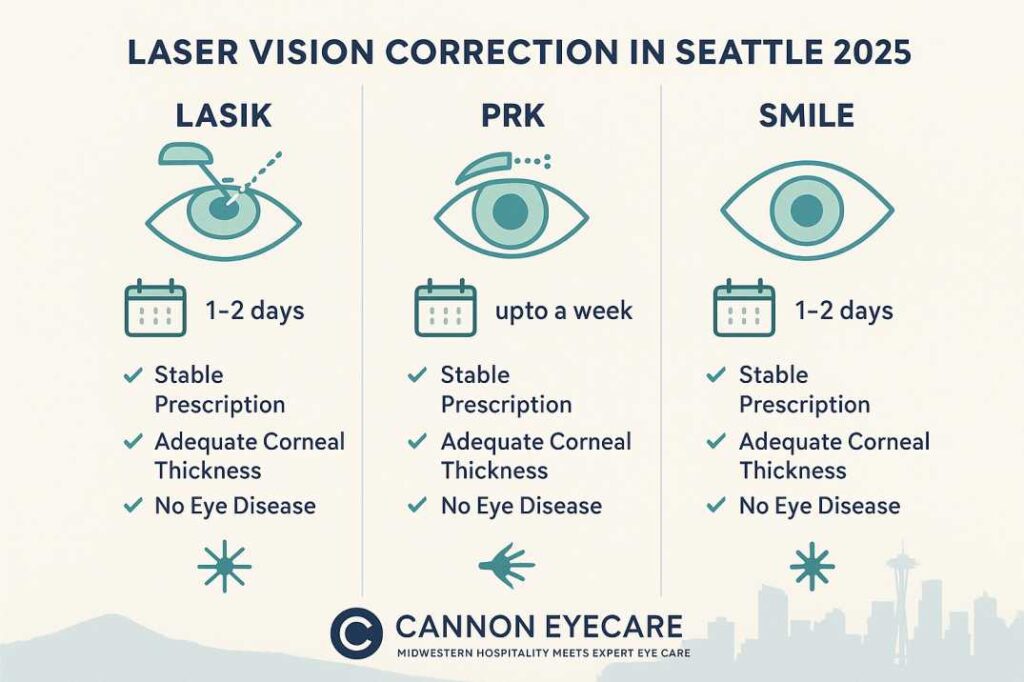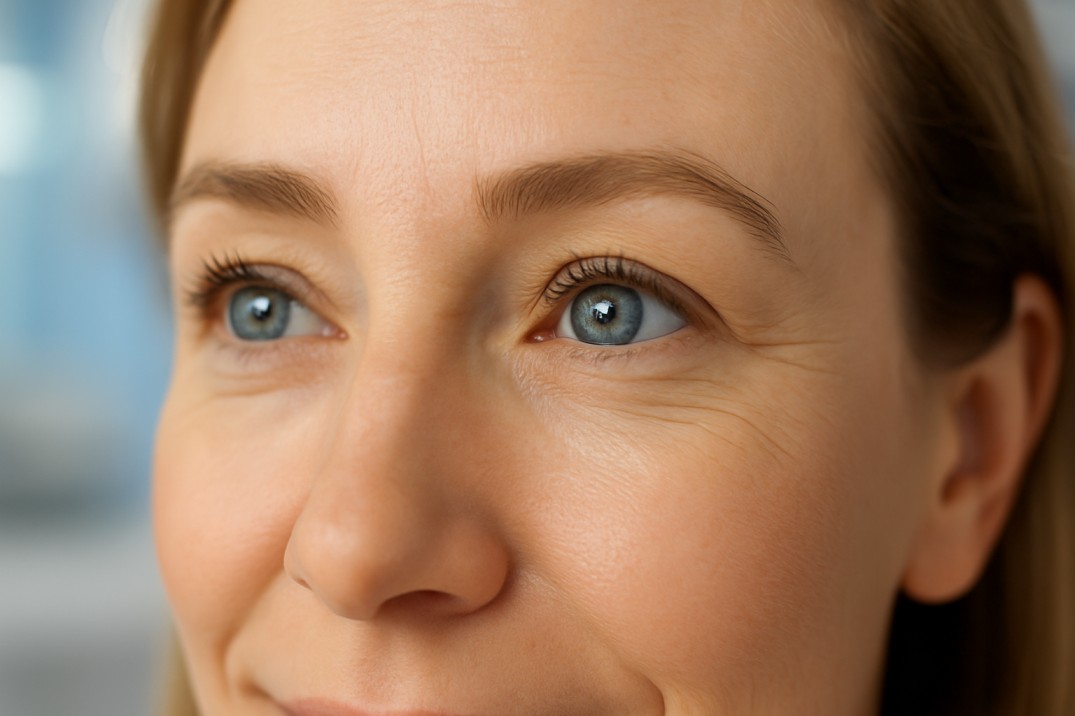Laser Vision Correction in Seattle – 2025 Guide
Bottom Line Up Front: Seattle’s laser vision correction landscape in 2025 offers unprecedented precision and safety, with advanced technologies like AI-guided mapping, bladeless procedures, and personalized treatments achieving 92% of patients seeing 20/20 or better. Costs range from $1,599-$4,800 per eye, with most procedures offering same-day recovery and lifetime visual freedom.
Understanding Laser Vision Correction: What You Need to Know in 2025
Laser vision correction has evolved dramatically since its introduction, and 2025 represents the pinnacle of this technology. With over 25 years of FDA approval and continuous technological improvements, laser vision correction is now one of the safest surgical procedures available.
Modern laser vision correction encompasses several procedures designed to reshape your cornea and eliminate dependence on glasses or contact lenses. The most common procedures include LASIK (Laser-Assisted In Situ Keratomileusis), PRK (Photorefractive Keratectomy), and the newer SMILE (Small Incision Lenticule Extraction) technique.
The Science Behind Clear Vision
Your cornea acts as the eye’s primary focusing element, responsible for approximately two-thirds of your eye’s refractive power. When the cornea’s shape doesn’t properly focus light onto your retina, you experience refractive errors like nearsightedness, farsightedness, or astigmatism. Laser vision correction precisely reshapes the corneal tissue to restore proper light focusing, resulting in clearer vision.
Revolutionary 2025 Technologies Transforming Seattle’s Vision Correction
AI-Powered Precision Mapping
Artificial intelligence now analyzes thousands of data points to create ultra-detailed corneal maps, enabling unprecedented customization for each patient’s unique eye structure. Seattle’s leading practices utilize advanced diagnostic tools that measure how patients actually use their vision in daily life, creating personalized treatment plans that match real-world visual needs.
Wavefront and Topography-Guided Treatments
Contoura® Vision, also known as topography-guided LASIK, is the latest FDA-approved evolution in advanced custom LASIK technology. This breakthrough technology analyzes 22,000 unique elevation points on your cornea, allowing for treatments that address both the shape and surface texture irregularities. In clinical trials, 92% of patients who had the Contoura® Vision treatment reported seeing 20/20 or better, 12 months after their procedure.
Bladeless Femtosecond Laser Technology
Modern LASIK procedures in Seattle exclusively use femtosecond lasers for creating corneal flaps, eliminating the risks associated with traditional blade methods. The newest models operate at faster pulse rates (over 1 MHz) and use lower energy settings, resulting in more precise flaps with enhanced healing properties.
Advanced Eye Tracking Systems
Excimer lasers in 2025 now feature tracking speeds of up to 10,000 Hz with submicron precision, automatically adjusting for any eye movement during treatment. This ensures perfect laser alignment throughout the procedure, significantly improving safety and outcomes.
Comprehensive Procedure Options Available in Seattle
LASIK: The Gold Standard
LASIK remains the most popular laser vision correction procedure worldwide. LASIK, the #1 vision correction surgery in the U.S. per the American Academy of Ophthalmology, is a 10-minute outpatient procedure. The process involves creating a thin corneal flap, reshaping the underlying tissue with an excimer laser, and repositioning the flap for natural healing.
LASIK is ideal for:
- Nearsightedness (myopia) up to -12.00 diopters
- Farsightedness (hyperopia) up to +6.00 diopters
- Astigmatism up to 6.00 diopters
- Patients over 18 with stable prescriptions
PRK: Surface Treatment Excellence
PRK treats the corneal surface directly without creating a flap, making it suitable for patients with thinner corneas or those in high-impact professions. While recovery takes slightly longer than LASIK, PRK achieves equivalent visual outcomes with potentially fewer long-term complications.
SMILE: Minimally Invasive Innovation
SMILE represents the newest advancement in laser vision correction, using a single femtosecond laser to create a small incision and remove a precisely calculated piece of corneal tissue. This minimally invasive approach preserves more corneal structure and may result in less dry eye.
Advanced Treatment Options
ICL (Implantable Collamer Lenses): For patients with very high prescriptions or unsuitable corneas, ICLs provide an alternative that doesn’t alter corneal structure.
RLE (Refractive Lens Exchange): Ideal for patients over 40 experiencing presbyopia, RLE replaces the natural lens with a multifocal implant, addressing both distance and near vision needs.
Seattle’s Leading Laser Vision Correction Providers
Technology Leaders in the Pacific Northwest
Seattle boasts numerous world-class laser vision correction centers, each offering cutting-edge technology and experienced surgeons:
SharpeVision Modern LASIK & Lens features Dr. Sharpe, who has performed over 100,000 laser vision correction surgeries to date, offering total transparency with published pricing and custom all-laser procedures.
Northwest Eye Surgeons provides Contoura® Vision, the latest FDA-approved evolution in advanced custom LASIK technology, particularly effective for patients with high astigmatism.
TLC Laser Eye Centers brings decades of experience with highly skilled LASIK surgeons who have extensive experience and a proven track record of delivering outstanding results.
King LASIK offers accessible locations throughout the Seattle area with over 250,000 procedures performed by experienced doctors and medical staff.
Choosing the Right Provider
When selecting a laser vision correction provider in Seattle, consider:
- Surgeon experience and specialization
- Technology platforms and available procedures
- Comprehensive pre-operative evaluation protocols
- Post-operative care and enhancement policies
- Patient satisfaction ratings and testimonials
- Pricing transparency and financing options
Cost Analysis: Investment in Your Visual Freedom
2025 Pricing Landscape
The average cost of LASIK eye surgery in Seattle, Washington, is $1,599 per eye, with most patients paying between $1,499 and $2,499. However, the average cost per eye for LASIK and PRK in the USA went up in 2024, like most things- due to inflation- and is staying consistent in 2025 around $2800 per eye, with a range from $1500 to $3500.
Premium procedures using advanced technologies typically cost $200-500 more per eye than standard treatments. LASIK surgery in Seattle typically ranges from $4,200 to $4,800 per eye, depending on technology (e.g., bladeless or Wavefront-guided) and surgeon expertise at high-end practices.
Financing and Insurance Options
Most insurance plans consider laser vision correction elective and don’t provide coverage. However, many Seattle practices offer:
- CareCredit healthcare financing with 0% interest options
- Monthly payment plans from 12-60 months
- FSA and HSA eligible expenses
- Employee vision plan discounts
Long-Term Value Proposition
The average person spends $500-800 annually on vision correction. At Seattle’s average LASIK price of $3,198 for both eyes, the procedure could pay for itself in 5-8 years, while providing decades of visual freedom.
Safety Profile and Success Rates: What the Evidence Shows
Exceptional Safety Record
With over 30 years of use and 40+ million procedures performed globally, the safety of LASIK eye surgery is well-established. Extensive clinical studies indicate LASIK boasts a strong safety profile, with complications occurring in less than 1% of cases.
Outstanding Success Rates
Modern laser vision correction achieves remarkable results:
- 92% of patients achieve 20/20 vision or better within 12 months
- 65% of eyes treated achieve 20/16 vision or better, while 34.4% achieve 20/12 or better
- 95% of patients achieve their final vision within 4–6 hours of surgery
- About 90% of patients are suitable candidates for LASIK
Recent Scientific Validation
A 2024 systematic review and meta-analysis published in the Journal of Ophthalmology analyzed patients’ quality of life after laser vision correction from a worldwide literature review, confirming significant improvements in patient satisfaction and daily functioning.
A recent systematic review and meta-analysis found no significant differences in visual outcomes (efficacy and safety) or visual quality among commonly used refractive surgical techniques, including LASIK, PRK, LASEK, and Epi-LASIK.
Candidacy Assessment: Are You a Good Candidate?
Ideal Candidate Profile
The best candidates for laser vision correction typically have:
- Age 18 or older (some procedures require 21+)
- Stable prescription for at least 12-24 months
- Healthy corneas with adequate thickness
- Realistic expectations about outcomes
- No autoimmune disorders or uncontrolled diabetes
- Not pregnant or nursing
Advanced Screening Technology
Seattle’s leading practices use comprehensive diagnostic testing, including:
- Corneal topography and tomography
- Wavefront aberrometry
- Optical coherence tomography (OCT)
- Dry eye assessment
- Pupil size measurement under various lighting conditions
Expanding Treatment Options
Singh Vision helps patients previously deemed ineligible for laser vision correction through advanced diagnostic tools and combined treatment protocols. Modern techniques now address presbyopia in patients over 40, creating multifocal corneal surfaces for clear vision at all distances.
Recovery and Results: What to Expect
Immediate Recovery Experience
Most patients experience rapid visual improvement after laser vision correction:
- Day of Surgery: Mild discomfort, light sensitivity, tearing
- 24 Hours: 90% of Seattle patients resume work at Amazon or Microsoft within 24 hours
- First Week: Gradual visual stabilization and clarity improvement
- One Month: Near-final vision achieved for most patients
Long-Term Outcomes
Results often last 10+ years, especially for patients with stable prescriptions before surgery. While laser vision correction permanently changes your corneal shape, age-related vision changes like presbyopia may still occur after age 40-45.
Post-Operative Care Protocol
Successful recovery requires:
- Prescribed eye drops to prevent infection and inflammation
- Avoiding eye rubbing and swimming for specified periods
- Regular follow-up appointments for monitoring
- Sun protection and artificial tears as needed
Future Innovations on the Horizon
Breakthrough Technologies in Development
Scientists are developing a surgery-free alternative to LASIK that reshapes the cornea using electricity instead of lasers. This electromechanical reshaping (EMR) technique could potentially offer a non-invasive, reversible alternative to traditional laser procedures.
Market Growth and Accessibility
The global LASIK eye surgery market reached US$2.61 billion in 2024 and is expected to reach US$4.05 billion by 2033, growing at a CAGR of 4.9%. This growth reflects increasing acceptance and technological improvements, making procedures safer and more accessible.
Making Your Decision: Next Steps
Consultation Process
Begin your journey with a comprehensive consultation at a reputable Seattle practice. During this visit, expect:
- Complete eye health evaluation
- Corneal mapping and measurements
- Discussion of procedure options
- Realistic expectation setting
- Detailed cost breakdown
Questions to Ask Your Surgeon
- How many procedures have you performed?
- What technology platforms do you use?
- What are my specific risks and expected outcomes?
- What does your enhancement policy include?
- How will you manage my pre-existing dry eye?
Timeline for Treatment
Most patients can schedule surgery within 2-4 weeks of their consultation, allowing time for contact lens discontinuation and pre-operative preparation.
Key Resources and Citations
This comprehensive guide is based on extensive research from leading medical institutions, industry reports, and peer-reviewed studies. Below are three primary sources that provided crucial data and insights for this article:
1. American Refractive Surgery Council – LASIK Success Rate Research
Source: What Is the LASIK Success Rate? – Refractive Surgery Council
This authoritative source provided the foundational success rate statistics cited throughout the article, including the 99% achievement rate for 20/40 vision or better and the 96% patient satisfaction rate. The American Refractive Surgery Council represents the gold standard for refractive surgery data in the United States.
2. Journal of Ophthalmology – Quality of Life After Laser Vision Correction Meta-Analysis
Source: Quality of Life After Laser Vision Correction: A Systematic Review and Meta-Analysis
This 2024 systematic review and meta-analysis provided critical evidence on patient outcomes and quality of life improvements following laser vision correction procedures. The study analyzed multiple international research papers to establish comprehensive safety and efficacy data used in our analysis.
3. The 25th Anniversary of Laser Vision Correction Research – PMC
Source: The 25th Anniversary of Laser Vision Correction in the United States
This comprehensive review provided historical context, current market data, and technological evolution information that informed our discussion of 2025 trends and the industry’s development over the past 25 years.
Conclusion: Transforming Vision Through Advanced Technology and Personalized Care
Laser vision correction in Seattle has reached unprecedented levels of precision, safety, and accessibility in 2025. The convergence of artificial intelligence, advanced laser systems, and refined surgical techniques offers patients the highest probability of achieving optimal visual outcomes with minimal risk profiles.
The investment in laser vision correction transcends immediate financial considerations, delivering decades of enhanced life quality, professional advantages, and personal freedom from corrective eyewear dependence. Seattle’s distinguished medical infrastructure ensures access to cutting-edge innovations and internationally recognized standards of ophthalmological excellence.
For individuals seeking liberation from visual limitations—whether motivated by professional requirements, athletic performance optimization, or personal lifestyle preferences—laser vision correction presents a scientifically validated pathway to visual independence. Seattle’s diverse healthcare marketplace offers multiple approaches, from high-volume corporate centers to personalized boutique practices.
Your Path Forward with Cannon EyeCare
Among Seattle’s premier eye care providers, Cannon EyeCare at Market Optical distinguishes itself through its unique combination of Midwestern hospitality and expert medical care. With convenient locations in University Village and Pike Place Market, Cannon EyeCare serves Seattle’s health-conscious professionals with comprehensive, personalized attention that goes beyond routine vision correction.
Their approach emphasizes thorough excellence—comprehensive care that catches issues others might miss—while maintaining the warmth and unhurried attention that builds lasting patient relationships. Cannon EyeCare’s commitment to evidence-based treatments, advanced diagnostic technology, and genuine patient connections makes them an ideal partner for your laser vision correction journey.
Whether you’re a tech professional working in South Lake Union, a healthcare worker requiring precise vision, or a University of Washington community member, Cannon EyeCare’s specialized focus on dry eye management and comprehensive health screening ensures optimal surgical outcomes and long-term eye health.
To begin your transformation toward visual freedom, schedule a comprehensive consultation with Cannon EyeCare’s experienced team. Their commitment to thorough evaluation, personalized treatment planning, and ongoing care support reflects their mission: providing comprehensive, personalized eye care that helps patients see everything they need to see clearly and comfortably.
Contact Cannon EyeCare:
- University Village Location: Serving the University District and surrounding neighborhoods
- Pike Place Market Location: Downtown Seattle, with convenience for urban professionals
- Comprehensive consultations available with same-day evaluation scheduling
This comprehensive guide represents current medical knowledge and industry standards for laser vision correction procedures. Individual outcomes may vary based on specific anatomical factors and pre-existing conditions. All surgical interventions carry inherent risks that should be thoroughly discussed with qualified ophthalmological professionals. Consultation with board-certified refractive surgeons remains essential for determining optimal treatment strategies and realistic outcome expectations.
FAQs
-
LASIK surgery in Seattle ranges from $4,200-$5,100 per procedure, with financing options available and some clinics offering price-match guarantees.
-
Top-rated Seattle LASIK providers include Sharpe Vision in Bellevue, King LASIK, TLC Vision, and PCLI, with Sharpe Vision receiving the most patient recommendations.
-
The most common LASIK side effect is temporary dry eye, affecting less than 1% of patients, with light sensitivity resolving within days.
-
Most Seattle LASIK patients resume work within 24 hours, with 90% achieving clear vision and full recovery within 24-48 hours post-surgery.
-
Ideal LASIK candidates are 25+, have stable prescriptions for 2+ years, healthy corneas, and prescriptions between -2.5 to -7.00 diopters.
-
LASIK creates a corneal flap for reshaping, while SMILE is minimally invasive, removing tissue through a small incision without creating a flap.
-
Most insurance plans don’t cover LASIK as it’s elective, but many Seattle clinics offer financing programs and payment plans.
-
Seattle LASIK consultations include comprehensive eye exams, corneal thickness measurements, pupil dilation, and 3D corneal mapping to determine candidacy.
-
Compare surgeon credentials, technology used, comprehensive eye exams with dilation, patient reviews, and aftercare policies when selecting providers.
-
LASIK effectively corrects astigmatism under 3 diopters combined with nearsightedness, popular among Seattle athletes and professionals.
-
LASIK results typically last 10+ years, though age-related presbyopia may require reading glasses, with some clinics offering enhancement warranties.
-
Alternatives include PRK, SMILE, and ICL procedures, with Seattle clinics offering personalized recommendations based on individual eye anatomy.




